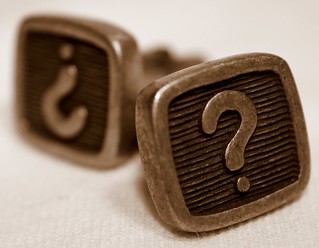 Questions are part of our everyday lives, and it’s a challenge to communicate without them. If you have ever played those games where you have to communicate without any questions you know what a fundamental role they play. There are many types of questions, each of which has a different purpose, including (but not limited to) probing, elaborating, clarifying, and planning.
Questions are part of our everyday lives, and it’s a challenge to communicate without them. If you have ever played those games where you have to communicate without any questions you know what a fundamental role they play. There are many types of questions, each of which has a different purpose, including (but not limited to) probing, elaborating, clarifying, and planning. Coaching questions tend to have particular characteristics, and a good coaching question has the power to support a coachee in a range of different ways. Well-framed questions can positively stimulate thought, motivate, inspire, and help your coachee recognise their own strengths such that they remain motivated, energised and focussed.
I will now discuss some of the characteristics of a ‘good’ coaching question, but not before emphasising that effective questioning goes hand-in-hand with effective listening.
Effective coaching questions are:
- Mostly open: Questions that start with, for example, “what”, “how”, or “if” and provide opportunities for a ‘wide’, sometimes surprising, response from the coachee.
- Focussed on solutions: The coach supports the coachee to explore underpinning frameworks that are influencing how the coachee considers an issue. The questions help the coachee identify options in a way that expands their thinking and ways of working (e.g. “What would you like to accomplish?”, and “What do you think you need to do to get a result that will work for you (or closer to your goal)?”).
- Neutral: Do not contain any elements of the coach’s reaction, opinion, or concerns (e.g. “What do you feel?”).
- Simple, short, clear and one at a time (with plenty of silence and space): Enables the coachee to focus on their thinking and ideas, rather than trying to figure out what the coach has just asked (e.g. “How could you appropriately communicate your point of view with the rest of your team?”). Multiple, rapid-fire questions can also interfere with the flow, and should be avoided.
- Motivating: Focus on the things a coachee might do to move toward identifying and designing their own strategies and solutions (e.g. “What if you knew the answer? What would it be?”).
- Have a positive effect on coaching outcomes: Questions that help the the coachee be creative to think of ideas and solutions that they may not otherwise have thought of (e.g. “If anything were possible, what are five possible options? What else?” And “What could you do differently?”).
- Investigator (knowledge): Who, what, when, where, why, how . . . ? Could you please describe . . . ?
- Guide (comprehension): Would I be right in thinking...? What did you understand from...?”
- Neutral inquirer (application): How do you feel X is an example of Y?; How would you say that X is related to Y?; Why do you feel that X is significant in your context?
- Investigator (analysis): What are the identifiable aspects of . . . ? Would you classify X according to Y?
- Investigator (synthesis): What are your thoughts around solutions for . . . ? What would you infer from . . . ? What are your additional reactions to . . . ? How might you go about designing a new . . . ? What could happen if you added . . . ?
- Advisor (evaluation): What do you think about trying . . . ? What is the most important outcome for.. . ? Which would you say are the highest priority for . . . ? What would help you decide to . . . ?
Image: Questions. CC ( BY NC SA ) licensed Flickr image by Tim O'Brien


